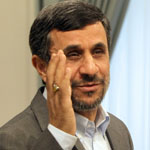James Acton | Los Angeles Times
It's time to call Mahmoud Ahmadinejad's bluff. Over the last few weeks, the Iranian president has stated on a number of occasions that his country will cease domestic efforts to manufacture fuel for one of its nuclear reactors if it is able to purchase the fuel from abroad. The United States should accept this proposal — publicly, immediately and unconditionally.
|
|
|
Juro Osawa | Wall Street Journal
A radiation scare gripping one of Tokyo's toniest residential neighborhoods took a sudden twist when local officials indicated that the contamination likely had nothing to do with the Fukushima Daiichi nuclear accident. A day after triggering fears with an announcement that elevated radiation levels had been found on a sidewalk in Tokyo's Setagaya Ward, local government officials reported Thursday that the radiation most likely is coming from bottles stored in a nearby wooden house. Full Article
Karolin Schaps | Reuters
Britain's nuclear regulator said he could shut down plants that fail to comply with recommendations put forward on Tuesday in response to Japan's Fukushima crisis. "If operators don't comply, we have various legal means and enforcement powers, but I'm sure the industry will respond effectively and the information we received already showed that they have taken a robust approach," said Mike Weightman, head of Britain's Office for Nuclear Regulation (ONR). Full Article
John Miller | Associated Press
France's state-owned nuclear reactor builder on Wednesday won a U.S. license to build and operate a gas centrifuge uranium enrichment plant in Idaho, a key step in the company's plans to expand production of nuclear fuel in the United States. The federal Nuclear Regulatory Commission's license for the $3 billion Eagle Rock Enrichment Facility authorizes Areva SA to enrich uranium for use in the manufacture of nuclear fuel for commercial power reactors. Full Article
Martin Matishak | Global Security Newswire
The congressional "super committee" assigned to identify avenues for reducing the nation's deficit by $1.2 trillion should consider cutting tens of billions of dollars intended to maintain and modernize the country's nuclear weapons complex, a senior House lawmaker said on Tuesday. "America needs a new nuclear weapon as much as Lady Gaga needs another new outfit," Representative Edward Markey (D-Mass.) said at a Capitol Hill news conference. Full Article
Daily News & Analysis
The agitation against Kudankulam Nuclear Power Plant near Tirunelveli reached a feverish pitch on Thursday with more than 10,000 activists laying siege to all the entry points to the project site. More than 700 scientists and technicians who reached the KNPP for their morning shift could not enter the reactor premises which broughtroutine works to a grinding halt. Full Article
|

